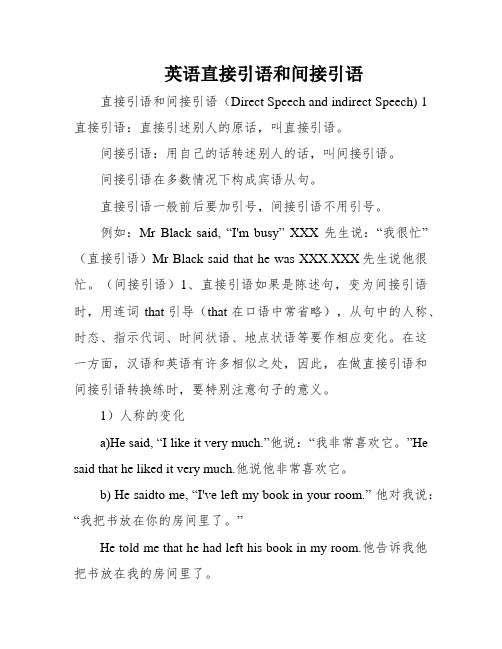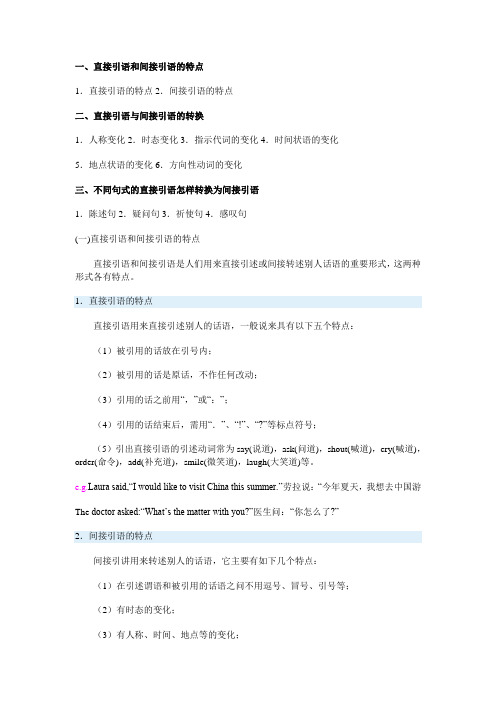直接引语和间接引语
直接引语和间接引语

直接引语与间接引语一、定义直接引述别人说的原话叫直接引语(Direct Speech)。
用说话人自己的话转述别人的话叫做间接引语(Indirect Speech)。
最明显的区别是有没有引号。
二、直接引语与间接引语变化规则直接引语变间接引语要遵循三部曲。
第一部:连词来引路。
1. 直接引语是陈述句,变成间接引语时用that引导。
He said, “I like music very much”.He said that he liked music very much.2. 直接引语是一般疑问句,变成间接引语时用if 或whether引导。
She said to me, “Are you leaving tomorrow?”She asked me if / whether I was leaving the next day.注意:if和whether都可译为\"是否\",二者引导宾语从句时通常可以互相替换,口语中多用if代替whether。
而以下几种情况中, 只能用whether:①强调两方面的选择,特别是句中有or not时。
如:Let me know whether you can come or not.②宾语从句放于句首时。
如:Whether this is true, I can't say.③用if引导有歧义时:if还可以引导条件状语从句是\"假如;如果\"之意,而whether可以引导让步状语从句,是\"不管;无论\" 之意。
当用if 引导既可以做条件状语从句用可以做让步状语从句时,用whether.He told me if he came back.他告诉我他是否来过。
另一种意思:如果他来了他就告诉我。
④在介词之后作介词的宾语时。
如:I haven\'t settled the question of whether I‟ll go back home.⑤在不定式前与不定式一起组成词组时。
直接引语和间接引语

直接引语和间接引语I 直接引语和间接引语概述:引述别人的话有两种方式:直接引语和间接引语。
一.直接引语:直接引述别人的原话叫直接引语。
引用直接引语时,汉语中多用冒号,而英语中多用逗号,而且把引用的别人的原话放在双引号之中,第一个字母要大写,句末标点符号放在双引号之中。
Mr Black said, "I'm busy ."二.间接引语:用自己的话转述别人的话叫间接引语。
间接引语不用引号,而多数情况下构成宾语从句。
从句中的人称,时态,时间状语,地点状语和指示代词等要做相应的变化。
Mr Black said that he was busy .(一)具体项目变化如下:(1) 人称的变化:一随主,二随宾,三不变。
即:直接引语中的第一人称随着(说话人)主语而变化,第二人称随着(听话人)宾语而变化。
第三人称不变。
He said to me ,''I've left my book in your room ."______He told me that he had left his book in my room .(2) 指示代词的变化:this____that these_______those(3) 动词的变化come_____goshall / should______should will /would_____wouldcan /could_____could may /might_____mightmust_____must(4)时间状语和地点状语的变化now____then ago______before/earliertoday____that day tonight_______that nightyesterday_______the day beforetomorrow______the next /following daythe day after tomorrow ______in two days' timelast week /month /year______the next week /month /yearhere______there(5)时态的变化(1) 当主句的谓语动词是现在时态时:直接引语变为间接引语时,如果主句的谓语动词是现在时态(一般现在时,现在进行时,现在完成时),那么在从句中,也就是在间接引语中,时态不变。
英语直接引语和间接引语

英语直接引语和间接引语直接引语和间接引语(Direct Speech and indirect Speech) 1直接引语:直接引述别人的原话,叫直接引语。
间接引语:用自己的话转述别人的话,叫间接引语。
间接引语在多数情况下构成宾语从句。
直接引语一般前后要加引号,间接引语不用引号。
例如:Mr Black said, “I'm busy” XXX先生说:“我很忙”(直接引语)Mr Black said that he was XXX.XXX先生说他很忙。
(间接引语)1、直接引语如果是陈述句,变为间接引语时,用连词that引导(that在口语中常省略),从句中的人称、时态、指示代词、时间状语、地点状语等要作相应变化。
在这一方面,汉语和英语有许多相似之处,因此,在做直接引语和间接引语转换练时,要特别注意句子的意义。
1)人称的变化a)He said, “I like it very much.”他说:“我非常喜欢它。
”He said that he liked it very much.他说他非常喜欢它。
b) He saidto me, “I've left my book in your room.” 他对我说:“我把书放在你的房间里了。
”He told me that he had left his book in my room.他告诉我他把书放在我的房间里了。
2)时态的变化如主句的谓语动词是一般过去时,直接引语变间接引语时,从句的谓语动词在时态方面要作相应的变化。
如主句的谓语动词是现在时,从句的时态则无需变化。
时态的变化例句直接引语间接引语一般现在时→一般过去时He said, “I'm afraid I XXX work.”He said that he was XXX.现在进行时→过去进行时He said, “I'm using XXX.”He said that he was using the knife.现在完成时→过去完成时She said, “I have not heard from him since May.”She said that she had not heard from him since May.一般曩昔时→曩昔完成He said, “I came to help you.”He said that he had come to help me.过去完成时不变He said, “I had XXX”He said that he had finished his homework before supper.3)指示代词、时间状语、地点状语和动词的变化:变革例句直接引语间接引语this-that这个-那个She said, “Iwill come this morning."She said that she would go that morning.these-those这些=那些He said, "XXX."He said that those books were his.now-then现在-那时He said, "It is nine 0'clock now."He said that it was nine 0'clock then.today-that day本日-那天He said, "I haven't seen her today."XXX.XXX-the day before今天-前一天she said, "I went there XXX."She said that she had gone there the day before.tomorrow-the next(following) day明天-第二天she said, "I'll go there tomorrow."She said that she would go there the next (following) day.here-there这里-那里come-go来-去注:(1)直接引语如果是客观谬误,变成直接引语时,时态稳定。
直接引语和间接引语

直接引语和间接引语(一)直接引述别人的原话,叫做直接引语;用自己话转述别人的话,叫做间接引语。
间接引语一般构成宾语从句。
直接引语必须放在引号内,间接引语则不用引号。
直接引语改为间接引语时,除将引语部分变成宾语从句外,还必须对直接引语中的人称、时态、指示代词、时间状语、地点状语等进行改变。
1. 时态的变化:直接引语变为间接引语时,通常受转述动词said,asked等的影响而使用过去化的时态,即把原来的时态向过去推,也就是一般现在时变一般过去时,现在进行时变为过去进行时等。
例如:Tom said to me,“My brother is doing his homework.”→Tom said to me that his brother was doing his homework.2. 人称代词、指示代词、时间状语、地点状语等等的变化;根据意义进行相应的变化。
如:She asked Jack,“Where have you been?” →She asked Jack where he had been.He said,“These books are mine.” →He said that those books were his.(二)直接引语改为间接引语时,都使用陈述语序,但是因为原句的句式不同,所以变成间接引语时所用的连词会有所不同。
1.陈述句的间接引语:陈述句由直接引语变间接引语,由that引导,可以省略。
“I want the blue one.” he told us. “我想要兰色的。
” 他说。
→He told us that he wanted the blue one.他说他想要兰色的。
She sa id to me, “You can’t do anything now.” 她对我说:“此刻你无法做任何事情。
”→She told me that I couldn’t do anything then.她对我说那时我无法做任何事。
直接引语和间接引语【3篇】

直接引语和间接引语【3篇】(经典版)编制人:__________________审核人:__________________审批人:__________________编制单位:__________________编制时间:____年____月____日序言下载提示:该文档是本店铺精心编制而成的,希望大家下载后,能够帮助大家解决实际问题。
文档下载后可定制修改,请根据实际需要进行调整和使用,谢谢!并且,本店铺为大家提供各种类型的经典范文,如总结报告、演讲发言、策划方案、合同协议、心得体会、计划规划、应急预案、教学资料、作文大全、其他范文等等,想了解不同范文格式和写法,敬请关注!Download tips: This document is carefully compiled by this editor. I hope that after you download it, it can help you solve practical problems. The document can be customized and modified after downloading, please adjust and use it according to actual needs, thank you!Moreover, our store provides various types of classic sample essays, such as summary reports, speeches, planning plans, contract agreements, insights, planning, emergency plans, teaching materials, essay summaries, and other sample essays. If you want to learn about different sample formats and writing methods, please pay attention!直接引语和间接引语【3篇】直接引语和间接引语篇一1.直接引语直接引用别人的原话叫做直接引语,直接引语通常置于引号内(“引用原话”)。
直接引语和间接引语

直接引语和间接引语1.直接引语和间接引语概述:(一)直接引语和的定义:直接引用人家的原话,被引用的部分称为直接引语。
用自己的话把他人的原话表达出来,被转述的部分称为间接引语。
例如:He said:“I am going to see a football match.”(直接引语)He said that he was going to see a football match. (间接引语)(二)直接引语的构成:①直接引语要用引号与句子的其他部分分开。
②直接引语对于原话不做任何变动,保持原来的句型结构,人称,时态和标点符号等。
③直接引语没有时态呼应的问题,不需要和句子的谓语动词保持一致。
(三)间接引语的构成:①间接引语的基础是直接引语,直接引语转化为间接引语有以下原则:1 去掉冒号和引号,用从属连词将间接引语和主句相连,构成一个主从复合句。
2 人称要做相应的调整。
3 时态调整时要注意时态的呼应。
2.直接引语转化为间接引语:①当直接引语主句的谓语动词是过去时时,其后面间接引语中的谓语动词都应该是过去时。
例如:She said:“I will go swimming tomorrow.”She said that she would go swimming the next day.Tom told me:“I went to Beijing last month.”Tom told me that he had gone to Beijing.Jack told me:“I have waited for you for a long time.”Jack told me that he had waited for me for a long time.②当句子的谓语动词是现在时时,间接引语的动词时态保持不变。
例如:He says:“I want to study English.”He says that he wants to study English.③如果直接引语说的是一般真理或是永恒的事实,在变为间接引语时,仍然保持原来的时态。
直接引语和间接引语

直接引语和间接引语Name ____________ No._________一、直接引语:直接引用别人的原话。
具有以下特点:①直接引语通常置于引号内,不作任何改动。
②没有时态呼应的问题。
③引用原话前可以用逗号“,”,也可以用冒号“:”。
④第二个引号前,亦即用重述的话之末,按其类别放一个句号(.)或问号(?)等。
二、间接引语:用自己的话转述别人的意思,或引用自己说过的话。
间接引语多数用宾语从句来表达。
间接引语具有以下特点:①不要逗号,冒号,引号。
②要考虑人称的变化(人称的变化与汉语是一样的)。
③要考虑时态的变化。
④要考虑时间状语的变化,地点状语的变化和指示代词的变化。
三、直接引语与间接引语的转换。
(见附表)㈠转述陈述句或感叹句,去冒号和引号连词用that (that,无词意,不作成分,口语中可省))接宾语从句,,从句中要作人称、时态等相应的变化(时态为“主现从实,主过从相过”;人称/物主/反身等代词:引号内的第一人称改为与主句的主语相同的人称;第二人称改为第一人称;第三人称不变。
)。
例如:"You speak English very well." She said.她说,“你英语讲得不错”。
She said that I spoke English very well.她说我英语讲得不错。
练习:①Miss Jiang says,"I am your teacher."②Mr Chen says,“I teach you English.”③Miss Jiang says,"I am writing."④Mr Chen says,"I will go to Chengdu."⑤Miss Jiang says,"I was watching TV at that time."⑥Mr Chen says,"I have worked here for ten years."⑦Miss Jiang said,"I am your teacher".⑧Mr Chen said,"I am writing."⑨Miss Jiang said,“I teach you English.”⑩Mr Chen said,"I will go to Chengdu."㈡转述一般疑问句,去冒号和引号。
直接引语和间接引语

直接引语和间接引语直接引语和间接引语是我们在日常交流和写作中经常使用的表达方式。
它们可以用于引用他人说过的话或表达他人的观点。
本文将从直接引语和间接引语的定义、用法、格式以及示例等方面进行探讨。
一、直接引语的定义和用法直接引语是直接将别人所说的话原封不动地引用出来。
它使用在双引号内,并保留原话的语言、说话者、时间以及语气等细节。
直接引语常用于报道、采访、对话等情境下。
直接引语的使用可以起到以下几个作用:1. 引证权威观点:通过引用权威人士的话语来支撑自己的论点,增强说服力。
2. 描绘情境:通过重述对话来展示人物性格、剧情发展或者交流背景等。
3. 引发思考:引用有趣、独特或争议性言论,引起读者的兴趣和思考。
二、直接引语的格式和示例在文章中使用直接引语需要遵守一定的格式,包括引号的使用、标点符号的位置和引用的来源注明等。
以下是直接引语的一些示例:1. 用于引证权威观点:据专家John Smith的观点,他指出:“生活中没有什么比读书更重要的了。
”2. 描绘情境:小明开心地喊道:“终于放假了,我们可以一起去海边玩了。
”3. 引发思考:一位作家曾经说过:“真正的教育是培养学生的创造力和独立思考能力。
”三、间接引语的定义和用法间接引语是将别人说过的话或表达的观点进行转述和扩展,而非原封不动地引用。
它通常用于报道、评论、总结等情境下,并不需要使用引号。
间接引语的使用可以起到以下几个作用:1. 简化表达:将原话进行概括或简化,提炼出关键信息,以便更好地传达给读者。
2. 科普知识:将专业领域的观点或研究成果以浅显易懂的方式转述,普及知识。
3. 加强解释:在引述别人观点的同时,加入自己的解释和理解,使读者更易理解。
四、间接引语的格式和示例在文章中使用间接引语同样需要遵守一定的格式,包括标点符号的位置和引用来源的注明等。
以下是间接引语的一些示例:1. 简化表达:他告诉我,他感到非常高兴因为放假了。
2. 科普知识:根据研究,多喝水对保持身体健康非常重要。
直接引语和间接引语

直接引语和间接引语一、直接引语直接引语就是直接引用别人的原话,并在原话前后加引号;间接引语就是用自己的话转述别人的话,多数以宾语从句的形式构成,不加引号而多用连词that引导宾语从句。
直接引语变为间接引语需要有人称和物主代词的变化、时态的变化、指示代词的变化以及时间和地点状语的变化。
1人称的变化主语为第一人称时,转变为间接引语之后,人称要作相应的调整。
例如:She said:“I am tired.”她说:“我累了。
”She said that she was tired.她说她累了。
The headmaster said to us:“You must study hard now.”The headmaster told us that we had to study hard then.2 时态的变化直接引语变为间接引语时,间接引语的时态要与主句的时态一致。
其规律一般是:直接引语间接引语一般现在时一般过去时;一般过去时过去完成时;一般将来时过去将来时;现在进行时过去进行时现在完成时过去完成时;过去完成时不变;She said:“I am your mother's friend.””→She said that she was my mother's friend.她说她是我妈妈的朋友。
(一般现在时变为一般过去时)Susan said to her mother:“I am reading this book.”→Susan told her mother that she was reading that book.苏姗告诉她母亲她正在看那本书。
(现在进行时变为过去进行时)He said:“We have built up the bridge across the river here.”→He said that they had built up that bridge across the river there .他说他们已经在那里建成了横跨那条河上的大桥。
直接引语和间接引语

直接引语和间接引语一、直接引语和间接引语的概念直接引语和间接引语是叙述人们说话的两种方法。
直接引语指说话人直接引用别人的原话。
这样重复的话语要放在引号内,且在原话前加逗号,引号内每个句子的第一个单词的首字母必须大写。
例如:He asked, “Where did you go?” 他问:“你到哪里去了?”间接引语是指说话人用自己的话把别人的意思转述出来。
间接引语在多数情况下是变成宾语从句,即和主句一起构成一个含宾语从句的主从复合句,不用引号。
例如:She said (that) those books were hers. 她说那些书是她的。
二、直接引语转间接引语直接引语在转换成间接引语时,要注意人称的变化、句子结构的变化、主从句时态的一致、语序的变化、指示代词的变化、时间状语的变化、地点状语的变化以及部分动词的变化等事项。
1、人称的变化直接引语在转换成间接引语时,人称的变化规则是:一随主,二随宾,三不变。
1) 一随主:即直接引语中的代词是第一人称时,在间接引语中必须和主句的主语相一致。
例如:Tom says, “I’m from America.” 汤姆说:“我来自美国。
”→To m says (that) he is from America. 汤姆说他来自美国。
(I变成了和主语Tom 相一致的he)2) 二随宾:即直接引语中的代词是第二人称时,在间接引语中必须和主句的宾语相一致。
例如:She asked me, “Where do you live?” 她问我:“你住在哪里?”→She asked me where I live. 她问我我住在哪里。
(you变成了和宾语me相一致的I)3)三不变:即直接引语中的代词是第三人称时,在间接引语中保持不变。
例如:Kate sai d,” They like reading.” 凯特说:“他们喜欢阅读。
”→Kate said (that) they liked reading. 凯特说他们喜欢阅读。
直接引语和间接引语

一、直接引语和间接引语的特点1.直接引语的特点2.间接引语的特点二、直接引语与间接引语的转换1.人称变化2.时态变化3.指示代词的变化4.时间状语的变化5.地点状语的变化6.方向性动词的变化三、不同句式的直接引语怎样转换为间接引语1.陈述句2.疑问句3.祈使句4.感叹句(一)直接引语和间接引语的特点直接引语和间接引语是人们用来直接引述或间接转述别人话语的重要形式,这两种形式各有特点。
1.直接引语的特点直接引语用来直接引述别人的话语,一般说来具有以下五个特点:(1)被引用的话放在引号内;(2)被引用的话是原话,不作任何改动;(3)引用的话之前用“,”或“:”;(4)引用的话结束后,需用“.”、“!”、“?”等标点符号;(5)引出直接引语的引述动词常为say(说道),ask(问道),shout(喊道),cry(喊道),order(命令),add(补充道),smile(微笑道),laugh(大笑道)等。
ura said,“I would like to visit China this summer.”劳拉说:“今年夏天,我想去中国游The doctor asked:“What’s the matter with you?”医生问:“你怎么了?”2.间接引语的特点间接引讲用来转述别人的话语,它主要有如下几个特点:(1)在引述谓语和被引用的话语之问不用逗号、冒号、引号等;(2)有时态的变化;(3)有人称、时间、地点等的变化;(4)常用的引述动词有say(说道),ask(问道),shout(喊道),cry(喊道),order(命令),add(补充道),smile(微笑道),laugh(大笑道)等。
l said that he would stay in China for another year.米尔说他将在中国再呆一年。
(二)直接引语与间接引语的转换直接引语在很多情况下可以转换成间接引语,此时应注意人称、时态、地点状语和时间状语的变化,同时还应注意不同句式的变化。
直接引语和间接引

• 2、×××对×××说:“我……,你……, 他……。” • 如:张老师对小明说:“我今天中午有事情,不能 到公园去了,请你告诉张春,叫他不要等我了。” • 这样的句式中出现了“我”“你”“他”等人 称代词,在转述中,如还是把“我”改成“他”, 就和原句中的“他”混淆,产生误会,因而,原句 中的“他”要改成张春(引号中的那个人名)。 • 改为:张老师对小明说,他今天中午有事情, 不能到公园去了,请告诉张春,叫张春下午不要等 他了。 • 亦可把语句稍作改动,改为:张老师对小明说, 他今天中午有事情,不能到公园去了,请告诉张春, 下午不要等他了。 注意:句中的“他”一定是 指说话的那个人。
直接引语和间接引语
一、什么叫直接引语和间接引语
• (一)直接从别人嘴里说出来的是直接引语 (有提示语,和引语。一般带冒号、引号,) • 小红说:“我下午打算去公园。”是直接引 语。 • (二)你转诉别人说的话是间接引语(没有 提示语,不带冒号、引号,) • 小红说她下午打算去公园。是间接引语。 • (三)直接引用别人的原话时,被引用部分 称为直接引语;当用自己的话转述别人的话 时,被转述部分称为间接引语。
• b、直接引语中出现了第一人称的时候,改写为 间接引语时,要将第一人称改为第三人称。 (1)例:小云说:“我不玩了。” • 改为:小云说他不玩了。 • c、直接引语中同时出现了不同人称的时候,就 应该根据以上的各项进行改写。 • (1)例:老师十分和蔼地对她说:“我们为该 剧设计了一个旁白,你的口齿清楚,音色柔美, 希望你担任这个叙述者的角色。” 改为:老师 十分和蔼地对她说他们为该剧设计了一个旁白, 她的口齿清楚,音色柔美,希望她“我……,你……。” 如:张明对王芳说:“我今天中午要到商店去买 东西,回去可能要迟一点,请你告诉我妈妈。” • 这种类型的句子中出现了第一人称“我”,第二 人称“你”等人称代词,分析句子,句中的“你”就 是提示语(冒号前面的语句)的第二个人,即王芳。 • 在转述中,把“我”改成“他”、“你”指王芳, 可去掉,改成: 张明对王芳说,他今天中午要到 商店买东西,回去可能要迟一点,请告诉他妈妈。 •
直接引语与间接引语

“I like to watch TV,” she said. 她说:“我喜欢看电 视。” →She said that she liked to watch TV. 她说她喜欢看 电视。
He said, “I’m waiting for her.” 他说:“我在等她。” →He said that he was waiting for her. 他说他在等她。 “It will rain soon,” he said. 他说:“很快就会下雨。” →He said that it would rain soon. 他说很快就会下雨。 “She can swim,” he said. 他说:“她会游泳。” →He said that she could swim. 他说她会游泳。
直接引语变为间接引语时,有 个别动词也可能需要改变,如 come改为go,bring改为take 等。
“He will come today.” she said. 她说:“他 今天会来。” →She said that he would go that day. 她说 他那天会去。 注:若地点和场所未发生改变,come和 bring等也可不变。
直接引语间接引语的区别
直接引语:直接引述别人的话(句子 中有“”)。 间接引语:用自己的话转述别人的话, 叫“间接引语”(句子中一般无“”)
直接引语变为间接引语时,若主句为过去时态, 变为间接引语的宾语从句通常要将时态往后推一 个,即一般现在时变为一般过去时,一般将来时 变为过去将来时,现在进行时变为过去进行时, 现在完成时变为过去完成时,一般过去时也变为 过去完成时,等等(若直接引语为过去完成时,变 为间接引语可以不变)。另外,若直接引语中有情 态动词can, may等,也应变成过去式could, might等(情态动词must可以变为had to,也可不 变,should, ought to, had better 等可以不变)。
英语直接引语和间接引语

英语直接引语和间接引语1. 直接引语定义:直接引用原话,把它放在引号内,不需要改变句子结构中的时态或代词。
如下:They said, “We watched a movie last night.”他们说,“我们昨晚看了一部电影。
”2. 间接引语定义:用自己的话加以转述,被转述的内容不放在引号内。
间接引语大都是宾语从句,当直接引语为陈述句或者疑问句被转换成间接引语时,句子的结构,人称,时态,时间状语和地点状语等都要发生改变。
如下:Tom said, “I am so hungry.” (direct speech)汤姆说:“我太饿了。
”(直接引语)Tom said that he was so hungry. (indirect speech)汤姆说他太饿了。
(间接引语)在间接引语中我们可以发现人称I变成了he,动词am变成了was。
那么我们就来具体看看由直接引语变为间接引语时,我们的人称和时态如何变化:如何变人称:有一句顺口溜“一随主;二随宾;第三人称不更新”。
“一随主”是指在直接引语变间接引语时,如果从句中的主语是第一人称,从句中的人称要按照主句中主语的人称变化,如:She said, "My brother wants to go with me. "→She said her brother wanted to go with her.“二随宾”是指直接引语变间接引语时,若从句中的主语及宾语是第二人称。
从句中的人称要跟引号外的主句的宾语一致。
如:He said to Kate, "How is your sister now?"→He asked Kate how her sister was then。
“第三人称不更新”是指直接引语变间接引语时。
如果从句中的主语及宾语是第三人称,从句中的人称一般不需要变化。
如:Mr. Smith said, "Jack is a good worker。
直接引语和间接引语

间接引语时常改变进态,因为原来讲的话与转述这些话之间有一段时间间隔。
使用间接引语主要是为了简洁、紧凑地把话内容转述给第三者。
一. 直接引语1. 一字不改地引述别人的话,叫直接引语。
必须都用引号‘I never work on Sundays,‟ She said.‘我星期日从不工作,’她说。
二、间接引语说话人用自已的话转述别人的话,叫间接引再语。
间接引语需要由动词引述。
因此这种动词称为引述动词如say tell ask 等tell后面必须跟表示人称的间接宾语(tell sb….),而say后面则可跟或不跟to +讲话对象比较:He tells me/says to me that he‟s very busy.他说他很忙1.当引述动词为现在或将来时态,间接引语的时态不变:He says, …I‟m tired.‟他说:‘我累了。
’(直接引语)He says he is tired.他说他累了。
(间接引语)2.直接引语变间引语,其谓语动词时态变化规则如下:当引述动词为过去时态,直接引语变间接引语时,间接引语时态则一般应作相应变化,即时态呼应:一般现在时变成/一般过去时。
现在进行时变成/过去进行时。
现在完成时变成/过去完成时。
①一般现在时,变为一般过去时He said, … I never work on Sundays.‟他说,‘我星期日从来不工作。
’(直接引语为一般现在时)He said he neve r worked on Sundays.他说他星期天从不工作。
(间接引语变为一般过去时)②现在进行时,变为过去进行时She said, …he‟s waiting.‟她说;他在等待She said that he was waiting.她说他在等待。
③现在完成时,变为过去完成时Jack said, …I‟ve moved to another flat.‟杰克说:‘我搬到了另一套公寓里。
’He said that she had moved to another flat.他说他搬到了另一套公寓里。
直接引语和间接引语

直接引语和间接引语的讲解直接引语(Direct Speech):当我们引用别人的话语时,若引用的是原话,被引用的部分叫直接引语。
间接引语(Indirect Speech):当我们引用别人的话语时,也可以用自己的话把意思转述出来,这种转述的别人说话的部分叫做间接引语。
典型例句:1. She said ,” I like English very much. “(直接引语)(她说:“我非常喜欢英语”。
)典型例句:2. She said she liked English very much. (间接引语)(她说她非常喜欢英语。
)一、直接引语与间接引语的转化A. 陈述句的间接引语直接引语是陈述句,变为间接引语时,在多数情况下都构成一个that引导的宾语从句,引述动词通常是say, tell等。
与此同时,间接引语中的人称、时态和其他方面也要相应有所变化,其中人称的变化与汉语的变化是一致的。
例1)J ohn said, “I’ve been late again.”→ John said that he had been late again.例2)She said ,”We are very fond of sports.”→ She said that they were very fond of sports.B.疑问句的间接引语1.一般疑问句一般疑问句改为间接引语时,要用陈述语序,并要加连词if 或whether,其主句动词常用ask, wonder, want to know, didn't know等。
句末不用问号。
例1)My teacher asked me, “Do you like Ame rican country music ?”→ My teacher asked me if/whether I liked American country music.2. 否定的一般疑问句和选择问句如果直接引语为否定的一般问句或选择疑问句时,用whether……or not连接。
- 1、下载文档前请自行甄别文档内容的完整性,平台不提供额外的编辑、内容补充、找答案等附加服务。
- 2、"仅部分预览"的文档,不可在线预览部分如存在完整性等问题,可反馈申请退款(可完整预览的文档不适用该条件!)。
- 3、如文档侵犯您的权益,请联系客服反馈,我们会尽快为您处理(人工客服工作时间:9:00-18:30)。
I am hardworking. I am not lazy.
What did she say?
She said she was hard-working,
What did she say?
She said she was not lazy.
You can do better.
Direct speech
Reported speech
(1)人称作相应的变化 I he/she we they (2)时态作相应的变化
一般现在时 现在进行时 一般将来时 一般过去时 过去进行时 过去将来时
(3)间接引语无引号
Practice
She is very shy.
间接引语
then
that
that day
the next day the day before
this afternoon
that afternoon
1.‖I’m going home now.‖she said. She said_______________________ she was going home then. 2. ―I will call you tomorrow morning.‖Alice said to Tom.
将下列句子变为间接引语
1.“You should be more careful next time,” his father said to him.
His father told him that he should be more careful the next tim
2. Mr.Wang said,“I will leave for Shanghai on business next month, children”.
I’m good at playing basketball.
What did he say? He said he was good at playing basketball.
I am good at English. I do well in do well in English. What did she say? She said she was good at English. What did she say? She said she did well in English.
1) Can I borrow money from you?
She asked me if/ whether she could borrow money from me.
2) Are we friends?
Jim asked Mary if they were friends.
3) When and where shall we meet?
You are hard-working.
What did your English teacher say?
She said I was good at speaking.
You are good at speaking
What did your history teacher say?
He said I could do better.
Alice _____ Tom ___________________________ told she would call him.
3. ―We are having a surprise party for Linda now.‖
they were having a …for …then. Marcia said________________________________
4. The geography teacher said to us, ―The moon moves around the earth and the earth goes roun d the sun.
The geography teacher told us that the moon moves around the earth and the earth goes rou nd the sun.
The teacher told the boys and girls not to make so much no ise in class.
1. I said to him, ―I have lost my money . I will find it.‖ 2. She asked , ― Will you be free tomorrow?‖ 3. I asked her, ―Where are you going and what are you going to do tomorrow?‖ 4. His father said, ―Don’t climb this high tree in your new coat.‖ 5. The stranger asked, ― What’s your name?‖ 6. ―I’ll finish my work tomorrow,‖ she said. 7. The teacher asked, ―Can you do it ?‖ 8. The offier ordered his men, ―Don’t cross the river .‖ 9. My teacher asked, ―Is he coming?‖
report card
Name: Tom Class:
Math– hard-working Spanish- good at speaking
History— can do better
Science—— lazy student
What did your math teacher say?
The teacherHe said said to me I was hard-working.
5. She said to him, ―It’s time that you left here.‖
She told him that it was time that he left there.
(4)Direct speech 是一般疑问句时, 变为Reported speech要用if或whether引导,从句 再改成陈述句语序,时态随主句的时态而变化. (5) Direct speech 是特殊疑问句时, 变为Reported speech,从句要改成陈述句语序, 时态随主句的时态而变化.
She asked Mr. Li whether he had met that man at the station two hours before.
Direct Speech 是祈式句时,变为Reported Speech要用 ask或tell改写。
1.Write your names on your papers first,‖ the teacher said to us. The teacher told us to write our names on our papers first. 2. ―Please come here again tomorrow,‖ her friend said to her. . Her friend asked her to go there again the next/ following day. 3. ―Let me return the book for you,‖ he said. He offered to return the book for me. 4. ―Don’t make so much noise in class, boys and girls,‖ said the teacher.
10. The scientist asked me, ―What are you doing?‖
Lucy said …He isunfriendly.
Lily said …
She is friendly.
Ben said …
He is
Mary said …
smart.
He is
funny
Jack said …
Wang Xiaoya is famous in China. Tom told us …
He asked her when and where they should meet.
1.He said, ―Are you a student?‖ He asked whether I was a student. 2 ―Have you anything interesting I can read, Tom?‖ she said. She asked George if he had anything interesting she could read. 3.―Where are you going?‖ the father asked his son. The father asked his son where he was going. 4. ―Are you sorry for what you have done?‖the mother asked the naughty boy. The mother asked the naughty boy if he was sorry for what he had do ne. 5. She said, ―Did you meet this man at the station two hours ago, Mr. Li?‖
Mr. Wang told the children that he would leave for Shanghai on
